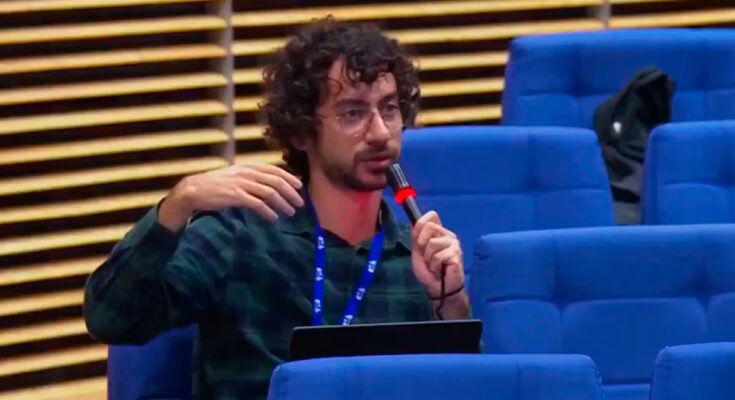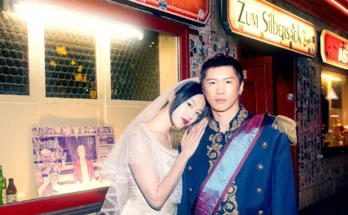Lawyers defend in trials, doctors treat illnesses, teachers teach in schools… And journalists, until now, ask questions. Uncomfortable, if possible, with intention, with twists, relevant and impertinent. But this began to be questioned a long time ago. The inconvenience in doing them and also the careful control of certain heights by those who do their job well.
—If Russia has to pay for the reconstruction of Ukraine, should Israel pay for the reconstruction of Gaza, given that it has destroyed virtually the entire Strip?
This is the question that Gabriele Nunziati asked point blank to the spokesperson of the European Commission on 13 October. It would have gone unnoticed given the response received…
— It’s an interesting question that we won’t comment on this time.
This is how the main spokesperson of the Commission, Paula Pinho, responded with a gesture like: “You will find out, because you are intelligent…”. And surely later, she and her superiors in the executive chaired by Ursula von der Leyen, or perhaps the leaders of the Italian government, took their cell phones and demanded an account from the media in question. After the last European elections and the establishment of the new Commission, journalists who simply ask questions are increasingly seen and treated worse in Brussels. It’s something that the best correspondents begin to suffer with restrictions and obstacles to their work. That more than fair question from Nunziati, therefore, can be a warning that serves as a lesson. Far from falling into oblivion or remaining a simple procedure, it has become a paradigm of the dark times in which we live. Another.
@eldiario.es Italian journalist Gabriele Nunziati reported being fired from the Nova news agency for asking the European Commission whether Israel should rebuild Gaza, which sparked debate over press freedom. On October 13, Nunziati asked a spokesperson during the daily press conference at the Commission the following question: “You insisted that Russia take responsibility for the reconstruction of Ukraine. Do you think Israel should pay for the reconstruction of Gaza?” Spokeswoman Paula Pinho responded: “It’s an interesting question, but we have no comment on it at this time.” #gaza #israel #brussels #europeancommission #journalist
♬ original sound – official eldiario.es
Three weeks later, the correspondent was fired from Agenzia Nova with the following argument from his agency’s top management: “It’s a technically wrong question,” they dared to say. If the question deserves such judgment from the gyrfalcons, what can we make of the answer they gave? Perhaps, morally and deontologically, they and their environment have fallen off a precipice. They wasted due obedience, submission to power, the wrong survival instinct for their seats… All this and more, about which I am now silent.
When we learned this craft decades ago in schools and universities they taught us to ask. That no question, not even the smallest, is superfluous. They made us fear that anger and problems might arrive precisely because we had not asked well, comfortably and sufficiently. That journalism consisted of a permanent questioning of power, of its implacable control. In which those responsible appeared before the media at a press conference, distorted their expressions and trembled when they found someone among the accredited pens.
The dark times came after the 2008 crisis where much of the mainstream media sold their soul to the devil to survive. “The party’s over,” we hear. But in that sentence we then realized that not only was the cut in our salaries implicit, but it also affected the exercise of the best journalism. They put our independence at the service of the economic powers so that they were not burdened by debt and also of politicians so that they did not execute the visible heads of the boards of directors. This led them to appoint commanders in newsrooms who, far from encouraging journalism, subjugated and limited dissenting voices to tame the newsrooms and turn them into docile swamps. Something against nature. As soon as some editorial offices noticed this, they began to fight in an exemplary way against these mercenary intruders. And they won. We won.
In many of them, it didn’t take long for the mediocrity rampant in offices to collapse. But in others it persists. As in the case of Agenzia Nova, which just provided a pertinent example of the world turned upside down and fired a journalist because he was doing his job well technically and morally, while the company applied tremendous hara-kiri to his credibility.
I just hope that Gabriele Nunziati will have no shortage of job offers from now on. The sooner the better. Because this would demonstrate that there are media outlets that prefer honest journalists to submissive ones. With this they will demonstrate that that nightmare, although it is not over and persists in a silent war of good against evil, has those who do not bend or back down in the face of uncomfortable calls. If he can’t find work anymore then we have a problem. Not the journalists. Democracy, dear friends, democracy.



